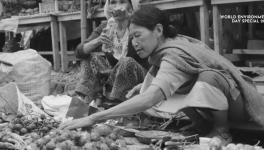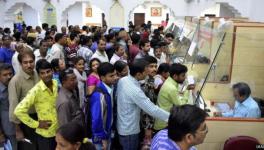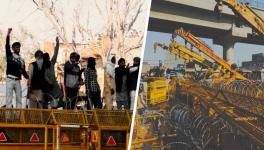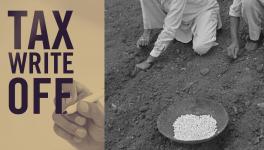The Upward Slope of Pandemic Politics
We live in extraordinary, unprecedented and uncertain times. Politicians, doctors, scientists, epidemiologists and every other policy and practice influencer seems to be shooting in the dark. Their decisions are knee-jerk and prescriptions tentative. The dominant idea of a market-led economy is in a shambles, at least temporarily. Analysts have started talking about the fallacy of neoliberalism and the exit door from neo-liberal times are being opened before us. The notion of de-globalisation is doing the rounds and ideas of nation-states, borders and federalism are getting renewed attention.
This is indeed a moment to pick out-of-the-box suggestions—letting prisoners out of overburdened jails, providing healthcare for all—and airing them before the public. Spain cleared its version of the old universal basic income idea recently. Many countries are making direct cash transfers to the unemployed workforce. Structural exclusions and divides are bubbling up to the surface too. So, India is grappling with an exodus of migrants and confronting the limitations of private healthcare models, and so on.
The future of these ideas and debates is as uncertain as our knowledge about the pandemic and how it will influence our lives and times. No one knows for sure if or for how long these discourses, which signify all our anxieties and fears, will stay.
What we know for sure is that a pandemic politics is unfolding all around us. In liberal democracies, this politics is increasingly appearing in the form of rule by decree. This is clear in the case of countries such as Hungary, where alongside the suspension of democracy, emergency measures have been legitimised as the new normal. Can we say this is true about recent political and administrative decisions in India as well?
Though we have seen plenty of rules, regulations, advisories, and physical and moral restrictions and restraints since the outbreak, there has been little debate in India on their deployment. Importantly, the outbreak itself was met with a wavering response in India, ranging from denial at first to grandstanding soon after. The arrogance of authority, near absence of opposition and an anxious public largely in consent, were on full display.
An extraordinary pandemic politics was initiated when the government did not allow parliamentary discussions on Covid-19, even though the legislature was already in session. This offered a clear hint that those in positions of authority did not want consultation and participation. Then came the stringent curtailments of liberties and mismanagement—vis-à-vis labour migration. The spectacle of clapping and banging of utensils and lighting of candles followed, each positioned as a national event, as if they were above the domain of party politics. People across party lines, with some exceptions, joined these spectacles.
The normal, regular politics of critiquing and challenging opponents absented itself from the public discourse, except for small groups on social media or a niche in the press and electronic media. But politics can never be suspended, put to rest or confined to a shallow recess. We do have a crisis of politics in the present moment, for the pandemic has exacerbated the disarray in the political Opposition. The regime in power is taking decisions with little or no questioning. Even where there is visible opposition, the government has wilfully ignored it, as was seen in the creation of an FCRA-exempt PM-CARES fund for donations. There is no clarity over this fund’s plan of expenditure or institutional oversight.
The same applies to the notification for change in land use under the Master Plan for Delhi 2021, which happened on the eve of announcement of the janata curfew. Thus was paved the way to redevelop the Central Vista and surrounding buildings, including Parliament Complex.
The lockdown has provided an opportune moment for the government to notify and then modify the domicile laws for Jammu and Kashmir. In J&K, reporters have been talking about authorities keeping a strict control over information related to the pandemic. Such control is being seen in other places as well, to different degrees and using various means. The media across the country, as is well known, is grappling with intense challenges during this crisis.
Shockingly, the government also decided to block funding of the MPLAD scheme. It is not coincidental that many Members of Parliament from the Opposition parties were committing these funds towards medical relief and facilities in their respective constituencies in light of the pandemic.
The conference calls between the Prime Minister and state Chief Ministers and political leaders are being publicised these days, and they may appear to be consultative exercises, but they clearly lack in democratic character. They do not appear to be going beyond a flow of information on administrative directions. There is no scope for opposition or criticism. Each decision has been cloaked in secrecy until its spectacular announcement. There are clear signals that the pandemic is being securitised.
The arrest of academics and activists, particularly those who were part of civil and democratic protests against the CAA legislation, which has been widely criticised as discriminatory and divisive, is an indication. Most shockingly, cases are being framed against activists under the stringent UAPA law, an anti-terrorism legislation that this government strengthened in 2019.
The government has largely acted with a free hand. Questions—which are yet to be answered—have been raised about the constitutionality of these arrests and the laws that have been invoked to make them. Yet, within the new normal of pandemic politics, the government has carved out a legitimacy for its actions, even when it goes beyond steps to control the pandemic.
Within this politics, the opposition is in a bind: any criticism may be presented by the regime as a disruption of steps to control the pandemic. So the Opposition has largely been confined to policy talk or suggesting measures to deal with the economic and medical crisis.
Though Covid-19 has spread the world over, its impact is largely shaped by the government in power and the leadership in each country. Hobbes explains that to exercise political rule is to “have the power of life and death over citizens”. And the reason to entrust anyone with such power is that society believes it is the price to be paid for collective safety. During this pandemic, safety and survival have been invoked as reasons to exercise exceptional and arbitrary power. The fear of contagion has made everyone a prospective “virus-spreader”. The “fear of getting infected” makes us distanced and self-centred. The idea of friendship, togetherness and affection is being altered.
The government and leaders—particularly those with majoritarian ideological moorings—have exploited our fears and anxieties to enjoy exceptional powers over life and death. The majoritarian elite have pre-empted criticism of their mis-governance of this crises by criticising foreign actors, international bodies, or they have fostered political discourses in which minorities are made the target. Conversely, governments have also started highlighting the laxity of their political opponents, particularly in areas where the local government is controlled by an Opposition party.
The temporary suspension of the rights of citizens to be free and autonomous beings highlights the attempt to reduce them to biological existence as “bare life”. The Italian philosopher Agamben has said that the crisis wrought by this pandemic would be used as a justification to normalise exceptional power. With India under enforced national lockdown, and localised enforcements through sealings, containment zones, and micro-spectacles of sanitisation drives, people are resigning themselves to compromise with other rights in the name of “biological” life.
It is not difficult for elite actors to conclude that wages may be suspended where there is a promise of rations! Associated with this is the fear that political regimes have the power to position the bodies of the political ‘Other’ as that of the biological ‘Other’, or a bio-threat.
Surveillance is a given now, through use of mobile phones, and movements and social contacts are being monitored. Everyone is considered a “suspect”. Civil and political rights have taken a back-seat in the times of pandemic.
Some of the most pressing questions today are not medical and economic, but political too. Will this politics of suspension extend further in time and in depth? After we emerge from the pandemic, how will we emerge from the politics of the pandemic? It’s time we started asking these questions.
Manish K Jha is professor at the School of Social Work, Tata Institute of Social Sciences, Mumbai, and M Ibrahim Wani is assistant professor, University of Kashmir. The views are personal.
Get the latest reports & analysis with people's perspective on Protests, movements & deep analytical videos, discussions of the current affairs in your Telegram app. Subscribe to NewsClick's Telegram channel & get Real-Time updates on stories, as they get published on our website.
























